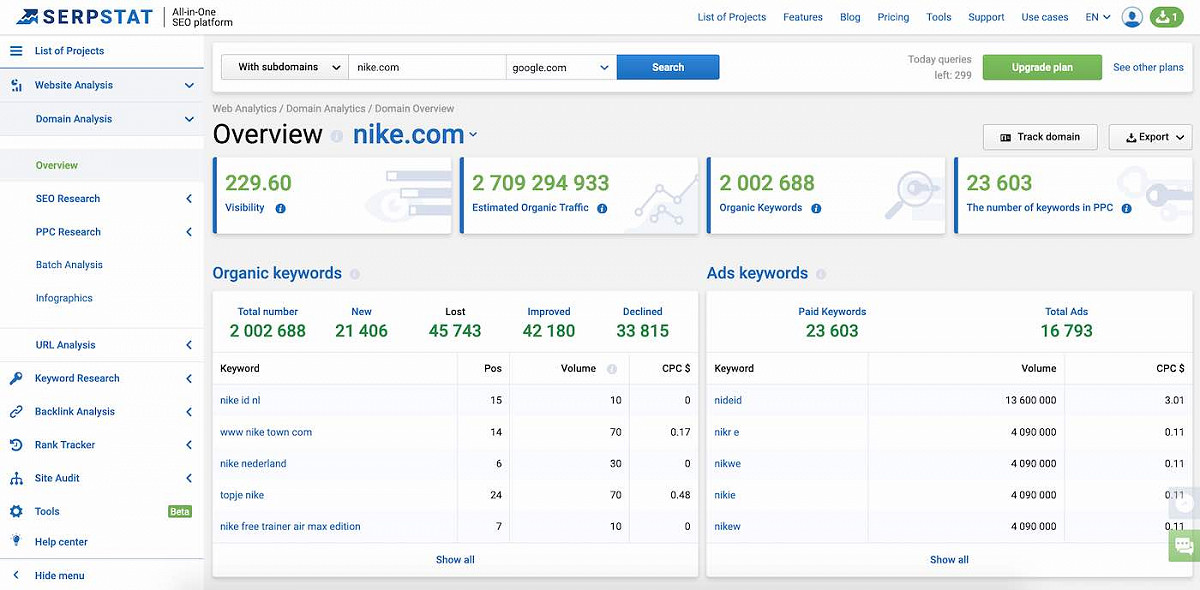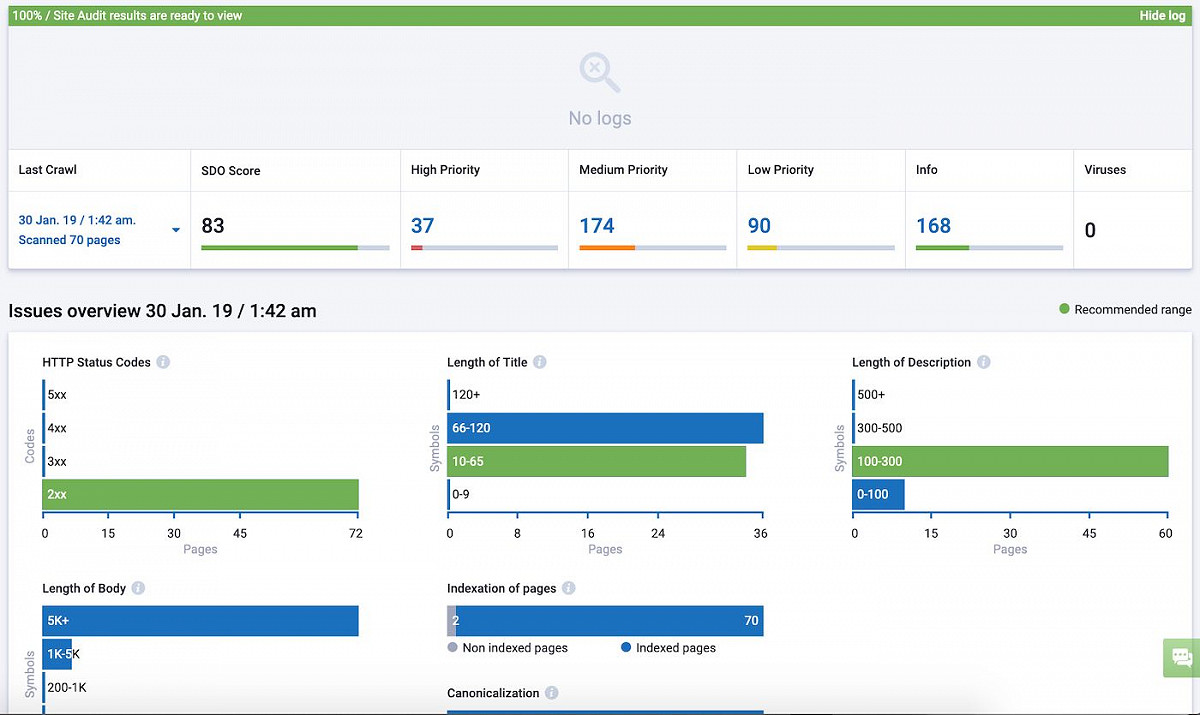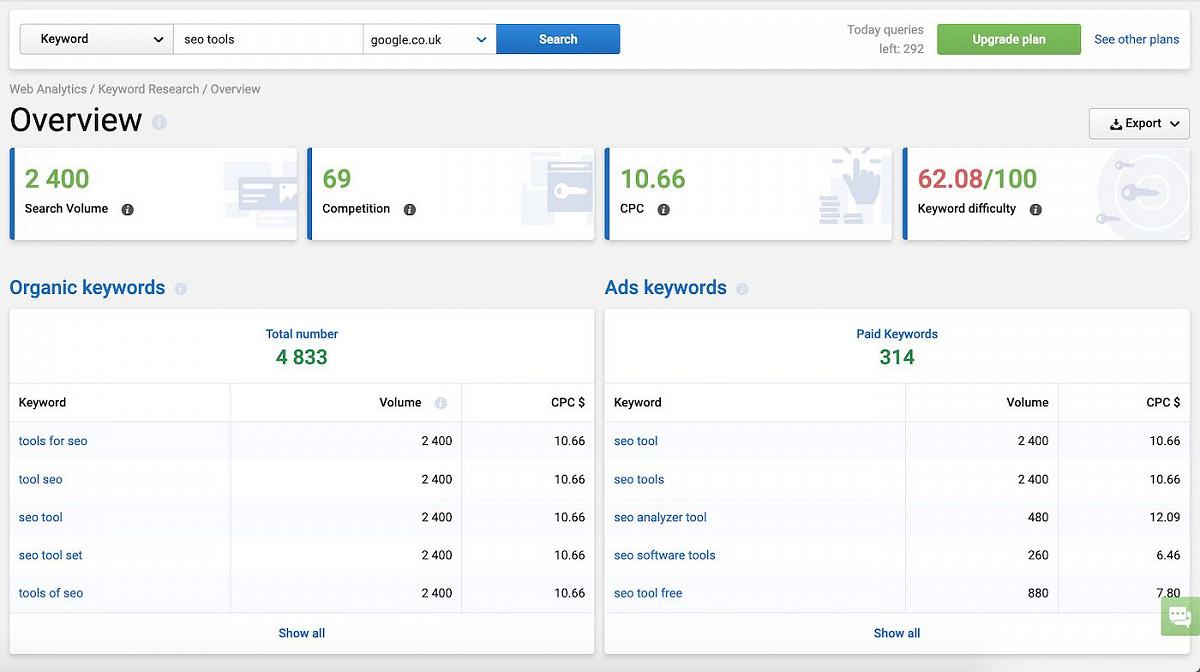Serpstat Review: Robust SEO & PPC toolkit with decent usage limits
Surges is 100% independent, but some links may earn us an affiliate commission. Learn more.
TL;DR
Serpstat is a solid all-rounder SEO toolkit, ready to help you discover new keyword opportunities, killer content ideas and competitor insights. Great for those who've earned their SEO stripes.
Serpstat Pros
- Data accuracy
- Usage limits
- Free SEO tools
- Unlimited domains
Serpstat Cons
- Very functional tool
- No exclusive features
- Lost backlink info
The Story
What is Serpstat?
Serpstat is a comprehensive SEO and PPC toolkit that promises to inform better content decisions and drive more traffic to your website. It can’t guarantee you top spot on Google, but gives you all the tools you need to be able to do so.
Good SEO is a marathon not a sprint. The same is true of Serpstat. Originally founded as a simple keyword research tool in 2013, Serpstat has gradually strengthened its armory to become a robust companion in a crowded marketplace that features big SEO hitters such as SEMrush, Ahrefs and MOZ. Today it offers seven core modules:
- Keyword research
- Rank tracking
- Backlink analysis
- Site audit
- Competitor analysis
- Content marketing ideas
- Advertising analytics
A pretty standard line-up for a premium SEO platform that fits with Serpstat’s positioning as a good all-rounder. Software that is that is easy enough to use yet more than capable of the in-depth analysis undertaken by search marketing professionals. Serpstat doesn’t have the added frills or big-name founder of its main rivals, but its price is far more palatable as a result.

Meet the Maker:
Oleg Salamaha
Serpstat was an in-house software now turned into an independent SaaS product. Founded by Oleg Salamaha and owned by his Netpeak digital marketing group, which also has the largest SEO and PPC agency in Eastern Europe on its books.
Serpstat started life trying to answer Oleg’s agency clients’ main problem: there was no competitive analysis and keyword research tool with a dedicated Ukrainian database. Once they’d cracked that, they felt the tools were strong enough to hold their own in the global market. Fast forward a few years and they must be doing something right – Serpstat is the most upvoted SEO tool on ProductHunt and the top selling SEO tool on AppSumo of all time!
The Product
How we tested Serpstat for this review
Serpstat was my education in SEO. I picked up the product as part of a TNW deal in 2016 when I wanted to improve my own websites’ search engine visibility and competitiveness. I’m now proudly self-taught thanks to spending a decent amount of time in the software and the core features I’ve relied on are Keyword Research, Rank Tracking, Backlink Analysis and Competitor Research.
I don’t sell SEO or PPC services, and don’t ever intend to, however I’ve put my trust in the tool for my own businesses which I think makes me well-placed to write this review.
Getting started with Serpstat
Great news: You can use Serpstat’s search analytics for free. Granted, the free account is limited to intel on a single keyword, domain or link but it’s a good hook. Should you wish to upgrade to a paid plan, pick the one that’s right for you and set up your first project – the home for all your website’s data or client’s website. That automatically populates a dashboard with high-level info about your site and call to actions such as ‘Site Audit’ enrich it from that point forward. Easy!
Whether you’re a new customer or just window shopping, Serpstat also offers personal demonstrations of the tool so can learn how to use Serpstat to reach you SEO goals faster.
Serpstat features you’ll love
-
Keyword Research
🔍Bread and butter for any SEO tool. Firstly, Serpstat gives you an overview of your chosen keyword’s popularity and difficulty helping you to uncover keywords worth ranking for. Use performance indicators such as search volume, external backlinks, cost-per-click, level of competition or number of search results to assess the keyword’s potential value to your site. Many competitors determine ‘Keyword Difficulty’ on backlinks alone so this added criteria is a big tick for Serpstat.
-
Rank tracking
🥇Serpstat’s advanced algorithm shines here too. Track the top 100 domains (rather than top 10-20 versus other tools) for every keyword across 12,000 major cities, and all the world’s countries and languages. Discover your keyword position distribution (top 10, top 40 etc) and your overall market share of your chosen keywords. Only bugbear here is that for some reason these results don’t always show-up in Serpstat’s dashboard of your site’s top organic keywords so I keep an eye on both lists.
-
Content Marketing ideas
🙋This subsection of ‘Keywords’ finds content suggestions based on people’s unanswered questions and common searches. Tap into the vast depths of Serpstat’s related keywords database and spot gaps that you can fill. An incredibly neat tool when used in combination with the keyword selection tool that sheds more light on each term’s potential.
-
Backlink analysis
🔗Serpstat’s backlink dashboard gives an instant overview of external link rating on a scale from 0 to 100, with their propertory Serpstat Domain Rank. The calculation principle is similar to the Google Page Rank principle.
Use the dashboard to also view your most-linked content and some detailed breakdowns of referring domains and pages - including their follow/nofollow status, and their Page Rank, Trust Rank and Alexa score. If you’ve embarked on a link building campaign, you’ll be interested in the chart showing new/lost backlinks collected over the last 120 days. However, this feature fails to tell you which sites have stopped linking to you which is a frustrating shortcoming.
-
Site Audits
🧰Consider this a SEO health check of your website. You don’t want your great content being held back by technical faults!
Serpstat took about 30 mins to perform its automated in-depth Site Audit of surges.co, highlighting the key ranking factors that search engines look for and the issues and opportunities for optimisation. Serpstat’s review of this site flagged up some duplication in headers and a meta tags issue I wasn’t aware of.
-
Competitor analysis
🕵️Spy on your competitors! Compare domains side-by-side and get to peek on their relative position in both organic and paid search results for each common keyword. Plus, understand which pages have the highest visibility and what drives it, along with backlinks and technical performance. Basically, a goldmine of intel!
If you’re unsure who your competitors are, you can also cast your net wide by typing your target keyword to check who’s ranking for it in organic search and paid ads. If same 4-5 competitors pop up in your keyword analysis, these are your benchmark for your site’s competitiveness so add them to your Serpstat project page and track them over time.
-
Advertising analytics
💲Not one I’ve used Serpstat for but here’s the lowdown… type in a keyword to see who’s bidding on those terms, how much it’s costing them and even get live examples of the paid ads in question. A bit a rabbit hole! One more click away is Ads Research, which lists related search queries to consider.
-
SEO Checker plugin
🔌In the spirit of saving its users even more time, Serpstat’s browser plugin allows you to check the key metrics of any site in only a few clicks. Getting on-page and domain analysis has never been easier! Results will also include quick links to the most popular Serpstat reports for more in-depth analysis. At the time of writing, the Serpstat SEO Checker is available for Google Chrome, Firefox and Opera.
Things to consider
-
Unlimited domains on every plan!
Not much we can add, but to say hallelujah! Multi-domain tracking comes as standard in all your projects, regardless of what plan you’re on. In return, you compromise on daily query limits. This will irritate some users but it’s hard to please everyone.
-
Impressive results accuracy
A common complaint amongst users of Google Search Console and lesser SEO software is that the data they report can be way off. Not so Serpstat. We found their SERP and keyword data to be highly accurate and up-to-date. Yes there are other tools with larger data sets (e.g. SEMrush has roughly double the keyword volume), however very few people will need such a longtail of search suggestions.
Another bonus from Serpstat is the intelligence shared across its huge userbase. If someone else has previously tracked your chosen keyword you’ll get access to its full SERP history.
-
Big data, big insights
At some point, we’ve all eagerly downloaded SERP data never to do anything with it. Serpstat knows this and tries to present insight in a way to that drives good decisions. For example, reports automatically pick out any keywords that your competitors’ pages have a top 10 ranking for but you do not. Site audits highlight the most pressing errors that are hurting your visibility and tell you how to fix them. And so on.
Beyond its usefulness, Serpstat’s UI is extremely flexible and user-friendly. Information can be presented in lots of ways: as raw data; charts; exported; as alerts; and even white label reports. Serpstat puts you in the driving seat.
-
For everything else, there’s API access
The Serpstat interface won’t be for everyone. Super-users will want to do some serious number crunching and create custom reports, which is where Serpstat’s API comes in. You’ll be pleased to know that virtually every report and data point is yours in JSON format to analyse on your own terms.
-
Team management mode
Serpstat offers multi-domain support and unlimited users as standard, however higher pricing plans open up a new feature: team management. Invite colleagues and divvy up account limits, set checklists and track their individual activities and performance. Coupled with white labelled reports it’s a big step from being able to run an SEO agency off of Serpstat.
Serpstat Pricing & Offers
from $69 per month
After the free plan, Serpstat’s entry level package costs $69. When you consider other popular SEO tools tend to start from $99/month, Serpstat is excellent value given you get access to more-or-less the same features.
Serpstat’s pricing then goes up dependent on the number of keywords and queries and depth of usage, plus extras such as team management and white label reports. Annual subscriptions come with a 20% discount.
Serpstat Alternatives
Serpstat competitors fall into two camps.
First up, they’ll be many entrepreneurs and marketers that are still using Google Analytics and Google Analytics alone. Serpstat is a definite upgrade for those wanting to take their SEO game more seriously plus as a solid all-rounder they’ll likely find it’s the only SEO tool they need.
Then there’s SEO pros and agencies either using several different tools or an all-in-one such as Ahrefs, Moz or SEMrush. Serpstat comes in cheaper than all those options. It’s not necessarily comparing like-for-like, for example it doesn’t have the social media tools or SEO writing assistant features of SEMrush. However, if you can live without those or don’t might taking out an additional subscription for a specialist third tool then there’s nothing lost.
Or you could combine Serpstat’s SEO platform with a trendspotting tool such as Exploding Topics to get ahead of the curve and rank for the next big thing before anybody else.
Serpstat Support 👍 or 👎
In all honesty, I haven’t had a need to contact Serpstat’s customer support since they upped their datasets. The SaaS is intuitive enough for users to be left to their own devices, however those with specific queries can find FAQs and in-depth tutorials complete with screenshots on how to get the most out of Serpstat.
Anybody wishing to improve their overall SEO know-how will find Serpstat Academy a useful resource. With modules such as ‘Essentials of On-Page SEO’, ‘Where And How To Find Long-Tail Keywords’ and ‘APIs for dummies’ it’s a good place to start for anyone new to SEO even if it is incomplete in its education.
The Verdict
Surges score
77%Ok, it’s not the most powerful SEO tool on the market, nor does it have any exclusive features or coaching built-in, but for a good number of SEO professionals Serpstat has everything they need.
Septstat’s reasonable price point and high feature count is a winning combination, making them a competitive contender for the SEO slot any marketer’s toolkit.
If you understand the basics of search engine optimization and are willing to invest 2+ hours with Serpstat you’ll gain enough actionable insight to improve the visibility of your website. Make that investment on an ongoing basis and it’ll pay real dividends.
Serpstat’s rapid growth into an all-in-one SEO and PPC planning tool is our gain. It’s clear they’re using their revenues to develop new features such as robust backlink analysis and advertising analytics, meaning it’ll only continue to get better too.
So, if you’re looking for robust SEO tool that opts for number crunching over user experience, Serpstat comes with my full recommendation. Make the most out of their free trial and see for yourself.







